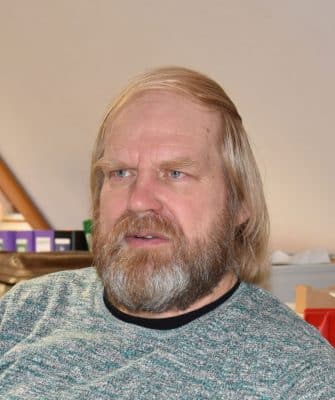For a long time, the wind power industry had no interest in energy storage, because it was much more lucrative to feed the power generated directly into the public grid. However, the end of the 20 years of guaranteed feed-in payments for the first turbines in Germany is in sight. Because of this, operators and planners, including Reinhard Christiansen, are looking for alternatives. Christiansen has been increasingly focusing his attention on wind power storage. However, it is still unclear whether returns from power-to-X or from methanization could be as high as what his wind farms generated in the past, that is, up to 12 percent. They could be with a suitable renewable energy policy.
Reinhard Christiansen’s office is in the former milling and mixing facility of his farm. Countless folders fight for space on the shelves. The different colored bindings stand for different companies, and since Christiansen leads several of these, the small room is a whirl of colors, all revolving around wind power.
Christiansen stopped his agricultural business in 1991. At the time, he was volunteer district chair for BUND, a national NGO focused on nature preservation and environmental protection, and realized that he could not put in the time to profit from farming if he wanted to make strides in renewable energy. He then got into the insurance business and, at the same time, dedicated himself to promoting and improving the use of wind energy.
Inspired by the booming industry in Denmark, he started work on creating his own wind farm and got the citizens of his village in northern Friesland on board. Although he was one of the first wind farm builders, he does not see himself as a pioneer, though he considers Hans-Detlef Feddersen, CEO of ee-Nord, to be one. Christiansen declares, “We have built on the knowledge of others.”
Although he, his fellow villagers and the nearby municipalities are now doing well financially, Christiansen is still working to optimize energy supply. It is not only the high excess capacity in the wind sector that is frustrating him. He is also highly critical of the politics surrounding the industry. For example, he says that electricity is being routed from Denmark instead of Germany to France because of long-term supply contracts, while the power produced locally is being throttled by German regulators. That network operators can then pass down substantial costs to consumers bothers him. Christiansen says, “We must, as an industry, show that we also don’t like it.”
Transforming transportation through hydrogen
The wind farmer is now turning to hydrogen technology, again as one of the first in the region, though he points out that others before him had already demonstrated the feasibility of storing wind power in the form of hydrogen. He now wants to use the gas to transform the transportation sector. “It can’t be that hard,” says Christiansen.
For this purpose, he, together with 55 businesses …


























0 Comments